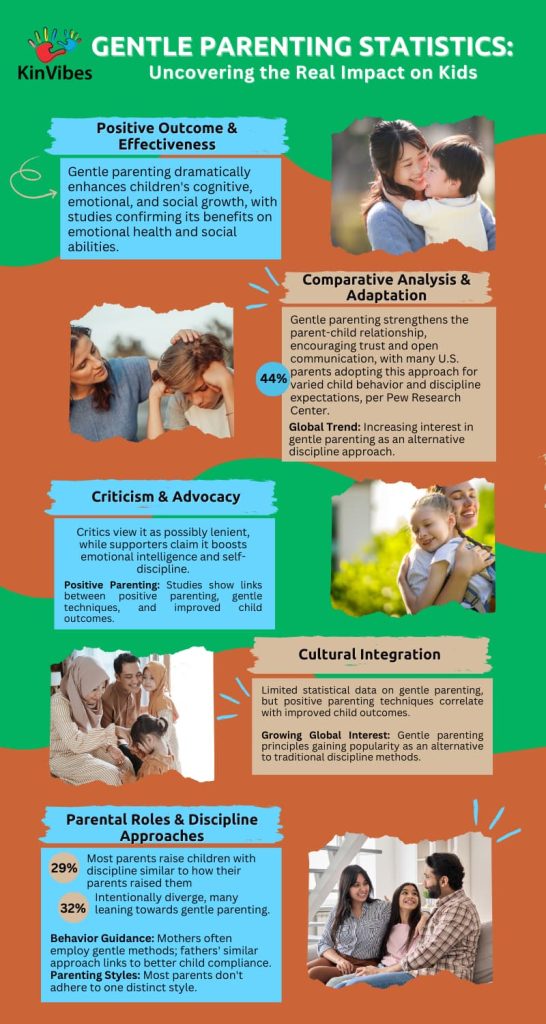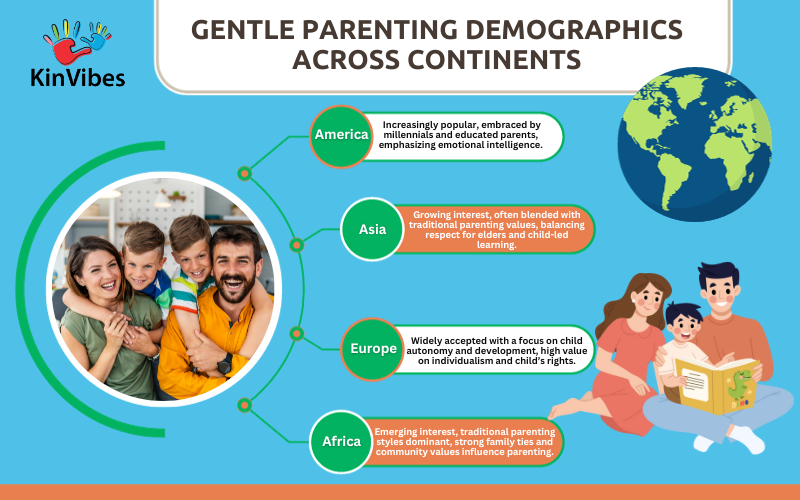Have you ever wondered how the way we raise our kids affects them in the long run? This article looks at gentle parenting methods, a kinder alternative to traditional parenting methods. It’s all about letting the child lead the way, helping them understand their feelings and emotions.
Gentle Parenting Statistics

Gentle parenting, a non-punitive, responsive, and empathy-based approach, has garnered significant attention for its impact on child development. Here are some key statistics and insights from recent research:
Positive Outcomes and Effectiveness
- Positive Effects of Gentle Parenting: Statistics show that gentle parenting can significantly improve a child’s cognitive, emotional, and social development.
- Effectiveness of Gentle Parenting: Several studies have shown positive effects on children’s emotional well-being, social skills, and overall development through gentle parenting practices.
Comparative Analysis and Adaptation
- Comparison to Traditional Parenting: Research has shown that gentle parenting practices can contribute to a more positive parent-child relationship characterized by increased trust, open communication, and a sense of security for the child.
- Comparison with Traditional Parenting Styles: A Pew Research Center survey found that roughly as many U.S. parents say they are raising their children similarly to how they were raised (43%) as say they are trying to take a different approach (44%), with comparable shares of parents pointing to expectations for their children’s behavior and discipline
- Prevalence of Gentle Parenting: While exact statistics are challenging to obtain, there is a growing interest in gentle parenting worldwide, with many parents seeking alternative approaches to discipline and embracing gentle parenting principles.
- Criticism and Support: Critics argue that gentle parenting may be seen as permissive or overly lenient, potentially leading to undisciplined children. However, proponents believe it promotes emotional intelligence and self-discipline more effectively and in a lasting manner.
- Cultural Adaptation: While there is a lack of specific statistical data on gentle parenting due to its relatively new and subjective approach, research shows that positive parenting techniques, including elements of gentle parenting, are associated with better child outcomes.
Parental Roles and Discipline Approaches
- Discipline and Parental Relationships: A survey found that only 29% of respondents are raising their children with discipline similar to how their parents raised them, and 32% are intentionally diverging from their parents on the matter, with quite a few consciously parenting differently subscribing to the philosophy of gentle parenting.
- Maternal and Paternal Guidance: A study examined the link between young children’s compliance and parental gentle guidance, finding that mothers used more gentle guidance than fathers, and there was a positive association between fathers’ use of gentle guidance and children’s compliance behaviors.
- Parenting Style: Most parents do not adhere to a specific parenting style.
Understanding Gentle Parenting Statistics
Amidst this increasing interest in gentle parenting, many parents look for credible statistics to understand how these gentle parenting methods compare to other traditional parenting methods. In light of this emotional need, it is essential to consider the studies and findings exploring this approach and evaluate its impact on children and parents.
Gentle parenting is an approach that focuses on nurturing a child’s development by providing empathy, understanding, and respect. This parenting style encourages parents by teaching children through compassion and conversation rather than punishment or control.
Parents who adopt this approach tend to prioritize building solid relationships with their children and emphasize the importance of emotional intelligence.
Core Principles
Demonstrating Empathy
One of the core principles of gentle parenting is demonstrating empathy towards the child. Parents try to put themselves in their child’s shoes, sensing their emotions and needs.
This helps create a supportive environment where children feel comfortable expressing their feelings. Developing empathy allows parents to understand their child’s own emotions and can result in raising children with improved communication, trust, and collaboration.
On Providing Guidance
Regarding teaching, gentle parenting relies on providing guidance rather than being overly authoritative. Parents using this approach avoid harsh punishments and instead opt for positive reinforcement and open communication. They believe that when a child leads, they learn best and feel encouraged, allowing them to grow and develop their problem-solving skills.
Level of Respect
Respect is another key component in this parenting style. Gentle parents treat their children with the same level of respect they would give to another adult. They validate and acknowledge their child’s feelings, and give them space to voice their opinions. This respectful atmosphere helps foster a sense of trust, allowing children to feel safe and confident in expressing themselves.
Although more research is needed to fully validate the long-term effects of gentle parenting compared to traditional parenting methods, early indications show promise in creating happy and well-adjusted children.
Research suggests that children raised in such environments may experience improved cognitive, emotional, and social development.
Although more research is needed to validate the long-term effects of gentle parenting fully, early indications show promise in creating happy and well-adjusted children.
Psychological Impact of Gentle Parenting
On Children
Gentle parenting has been shown to impact children’s mental health and emotional well-being positively. This approach focuses on understanding and addressing the root causes of children’s behavior, leading to reduced anxiety and stress levels.
For instance, studies show that a clinical child raised with gentle parenting display improved mental health.
Some key benefits for children raised with gentle parenting techniques include:
- Stronger emotional connections with their parents and siblings.
- Improved self-esteem due to the respect and empathy they receive.
- Enhanced problem-solving abilities as they learn to navigate challenges independently.
On Parents
Parents who practice gentle parenting report experiencing a greater sense of fulfillment and enjoyment in their role as caregivers. They feel less overwhelmed by parenting responsibilities and can often handle stress more effectively. Notable advantages for parents practicing gentle parenting include:
- Reduced parenting-related stress as they develop a positive and respectful relationship with their children.
- Greater satisfaction in their role as a parent, leading to improved mental health.
- Increased confidence in their parenting abilities and decision-making.
Impact on Family Dynamics
Gentle parenting can positively influence family and relationship dynamics by promoting trust, respect, and open communication among family members. Parents and children alike are encouraged to express their emotions and work together to resolve conflicts. This can lead to more harmonious relationships and a supportive, loving environment that benefits everyone involved.
Some ways gentle parenting contributes to improved family dynamics are:
- Encouraging open and honest discussions about feelings, values, and expectations.
- Working together as a team to address challenges and reach solutions.
- Providing consistency and predictability through routines and clear expectations.
Overall, gentle parenting can be a beneficial and effective approach to raising an emotionally healthy and well-adjusted human being. It offers an opportunity to create positive and fulfilling parenting experiences for both parents and their children, while also promoting a strong and connected family unit.
Demographics of Gentle Parenting

American Parents
In the US, this parenting style is gaining popularity among parents from various demographics.
Research suggests that parents with a college degree are more likely to practice this parenting approach, as they tend to be more knowledgeable of child development and psychology.
The prevalence of gentle parenting varies across generations. Millennials, in particular, have embraced this approach with open arms. They tend to emphasize open communication, emotional intelligence, and nurturing relationships with their children.
Furthermore, the COVID-19 pandemic has also influenced parenting decisions. As a result, it pushes more parents towards a gentle approach to adapt to the unique challenges posed by these unprecedented times.
Global Trends
Globally, gentle parenting is being adopted as an alternative to more traditional, authoritarian parenting styles. Though specific practices may differ across cultures, the underlying principles of empathy, trust, and respect remain constant.
In many countries, a shift towards gentle parenting is being driven by increased access to parenting resources and research. In this case, it just fuels more informed decisions about how to raise children in society.
Here’s a focused overview of gentle parenting demographics across continents like America, Asia, Europe, and Africa.
| Continent | America | Asia | Europe | Africa |
|---|---|---|---|---|
| Prevalence | Increasingly popular, especially among millennials and educated parents. | Growing interest, often blended with traditional parenting values. | Widely accepted, with a strong focus on child autonomy and development. | Emerging interest, with traditional parenting styles still dominant. |
| Cultural Influences | Emphasis on emotional intelligence and open communication. | Balance between respect for elders and nurturing child-led learning. | High value on individualism and child’s rights. | Strong family ties and community values influence parenting. |
| Education & Socioeconomic Status | More common among parents with higher education. | Varied adoption, often linked to urban, educated demographics. | Widespread across different socioeconomic groups. | Mostly seen in urban areas among educated parents. |
| Generational Trends | Millennials and Gen Z parents are more inclined towards gentle parenting. | Younger, more globalized parents are adopting this approach. | Cross-generational adoption with a focus on progressive parenting. | Slow generational shift with younger parents gradually adopting. |
| Policy & Support Systems | Various support systems in place, like parenting programs and childcare. | Limited support systems, with family and community playing a key role. | Strong social support systems, including parental leave and childcare. | Limited state support, with reliance on extended family and community. |
Impact of Parenting Styles Across Ethnicities
Parenting styles often differ across ethnicities due to cultural, social, and historical factors. These may explain how differences in parenting practices can impact children’s well-being and development.
In the US, research shows that Black (42%) and Hispanic (38%) parents are more likely than White (25%) or Asian (24%) parents to say their parenting approach differs from their upbringing.
However, it’s essential to recognize that no single parenting style is perfect or universally appropriate. Factors such as race, ethnicity, income, and education all play a role in shaping individual parenting choices. Embracing gentle parenting techniques, while also considering a family’s unique cultural context, can provide a positive impact and be an effective way to support children’s growth and development.
Comparative Analysis

Gentle Parenting Vs. Tiger Parenting
Gentle parenting focuses on building a strong emotional connection with a child through understanding, empathy, and effective communication. On the other hand, tiger parenting is more strict and disciplined, often emphasizing academic achievement and pushing children to excel.
In gentle parenting, discipline is based on few rules and guiding rather than punishment. In contrast, tiger parents might impose strict rules and consequences, and be highly critical with less emphasis on praise.
Emotional development: Gentle parenting promotes emotional intelligence by encouraging children to express their feelings openly and validate their emotions. This approach helps children develop self-awareness and emotional regulation. In contrast, tiger parenting may sometimes suppress emotional expression, potentially leading to low self-esteem and lack of self confidence.
Overall development: Gentle parenting focuses on the child’s holistic development, including their emotional, social, and cognitive growth. Tiger parenting leans more towards academic success and high achievement.
Structure and self-control: Gentle parents focus on fostering self-regulation and internal motivation in children. Meanwhile, tiger parents emphasize adherence to strict rules, the importance of consequences, and setting lofty expectations.
Gentle Parenting Vs. Permissive Parenting
Gentle parenting and the permissive approach share some similarities, such as valuing empathy and understanding, but the permissive style often lacks clear boundaries and consequences.
Discipline and praise: Gentle parenting encourages effective discipline and guidance while being cautious not to criticize too much. It focuses on providing balanced feedback for a child’s behavior. On the other hand, the permissive approach tends to overraise and avoid setting even necessary limits, potentially causing difficulty when children need to follow social norms or achieve a sense of self-discipline.
This study categorizes permissive parents as uninvolved, leading to less guidance and control.
Behavior and emotions: Gentle parenting helps children manage their emotions healthily and develop better self-control, leading to fewer behavioral issues. Meanwhile, children of permissive parents might struggle with self-regulation and are more likely to have behavior problems due to a lack of structure.
Boundaries and consequences: Gentle parenting sets clear and consistent boundaries while maintaining empathy and flexibility. On the contrary, the permissive style often struggles with defining and enforcing necessary boundaries, which can impede a child’s ability to understand consequences and societal expectations.
Impact of Gentle Parenting on Future Generations

Promoting A Strong Emotional Connection
One of the key aspects of gentle parenting is its emphasis on promoting a strong emotional connection between parents and their children. Therefore, it can reduce anxiety and other mental health issues, improving their overall emotional well-being.
Research has shown that children raised with this approach are more likely to develop a higher level of emotional intelligence and possess better self-control.
Encourage Independence
When it comes to education and financial independence, gentle parenting can play a significant role in encouraging children to become more independent and self-reliant. By fostering critical thinking skills and setting realistic expectations, gentle parenting can drive children to pursue a college degree and achieve financial independence in the long run.
Cultivate Social Skills
In the context of Parenting in America, gentle or positive parenting practices have been found to help children cultivate better social skills and exhibit more respectful behavior.
This approach encourages communication, collaboration, and mutual respect between parents and children, leading to a healthier family dynamic.
KinVibes Pro-Tip: It is important to note that gentle parenting doesn’t imply a lack of boundaries or discipline. Rather, it focuses on setting realistic and age-appropriate limits that help children learn self-control and personal responsibility.
Frequently Asked Questions
What are the benefits of gentle parenting?
Gentle parenting fosters a strong bond between parents and children and encourages empathy, understanding, and respect. It also helps develop emotional intelligence and problem-solving skills in children by recognizing them as individuals and responding to their needs.
How does gentle parenting compare to traditional parenting?
Traditional parenting often emphasizes consequences and punishment, while gentle parenting focuses more on empathy, understanding, and respect. It involves setting boundaries and offering guidance, rather than simply enforcing rules or administering punishment.
Does research support the effectiveness of gentle parenting?
Research on gentle parenting is still in its early stages. However, some studies suggest that this approach can lead to better social, emotional, and cognitive outcomes for children, as it promotes secure attachment, healthy communication, and encourages children to take responsibility for their actions.
What is the success rate of gentle parenting?
It’s difficult to provide an exact success rate for gentle parenting, as it can vary greatly depending on individual circumstances and how it’s implemented. However, many parents who adopt this approach report experiencing improved relationships with their children and a greater sense of satisfaction in their parenting role.
Do psychologists endorse gentle parenting?
Many child psychologists and experts, such as Dr. Laura Markham and Sarah Ockwell-Smith, advocate for gentle parenting. They believe that this approach fosters deeper connections between parents and children, supports emotional development and leads to long-term benefits.
How does gentle parenting relate to authoritative parenting?
Gentle parenting and authoritative parenting share some similarities, like setting boundaries and promoting open communication between parents and children. However, gentle parenting emphasizes empathy, respect, and understanding, while authoritative parenting may still rely on traditional discipline methods, such as rewards and consequences.
wrapping up – Raise Awareness Of The True Benefits Of Gentle Parenting
Gentle parenting, with its empathetic, nurturing, and responsive approach, represents a significant shift from traditional parenting methods. Notably, this approach fosters stronger emotional connections, encourages independence, and cultivates enhanced social skills.
While gentle parenting is not without its critics, the growing interest and positive outcomes point towards a future where parenting is grounded in understanding, respect, and empathy. As we move forward, it’s crucial to continue researching and adapting these methods to diverse cultural contexts, ensuring that the benefits of gentle parenting can be accessed and utilized by families across the globe.






